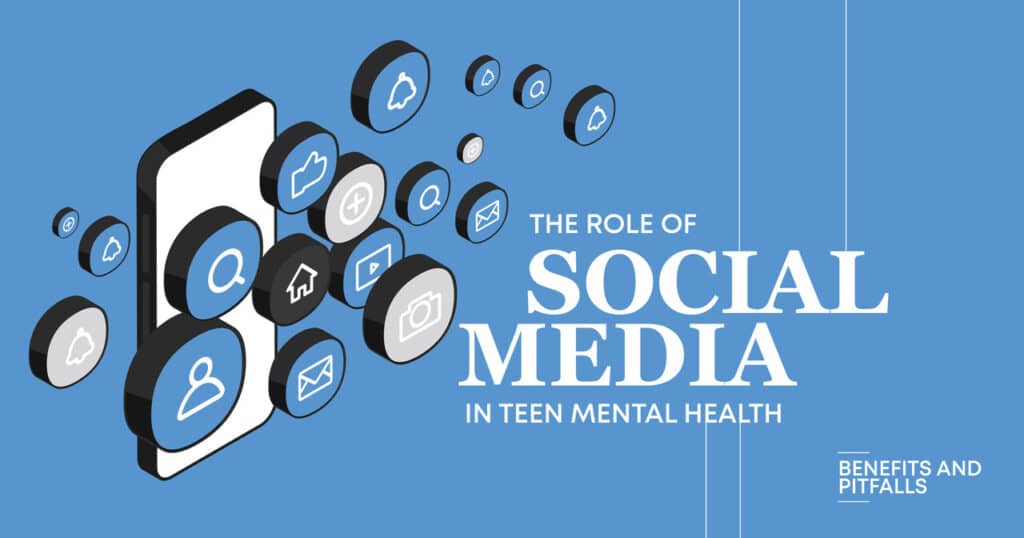Social media platforms have become deeply embedded in the daily life of teenagers. Social media’s influence on teenagers cannot be overstated. For many teens, it’s where they engage with friends, share moments of their lives, and seek validation. These platforms offer a sense of community and belonging, which can be incredibly valuable. For example, social media sites allow teen users to have positive interactions that can uplift their mood.
Essential Takeaways
- Social media offers benefits like supportive communities and creative outlets, but it also comes with risks, such as negative effects like cyberbullying and body image issues.
- Setting boundaries, encouraging critical thinking, and fostering open communication can help mitigate the potential risks of social media usage.
- Seeking support from mental health professionals and utilizing online resources can provide valuable assistance for managing social media-related challenges.
Yet, the same aspects that make social media appealing also bring challenges. Understanding why social media is so compelling can help us better grasp its effects on mental health.
The Pervasiveness of Social Media
Teenagers today have grown up with social media accounts as a constant presence. It’s not just about keeping in touch with friends anymore; it’s about creating an identity, gaining followers, and participating in online trends. Teen users often spend hours per day on these platforms, engaging in online activities that may impact their mental health.
This constant connectivity has reshaped how teens interact and view themselves, highlighting the need to understand this digital landscape’s positive and negative aspects.
Benefits of Social Media for Teen Mental Health
Building Supportive Communities
Social media can be a lifeline for many teens. It offers access to supportive communities where teens can find peers who share their experiences or interests. For example, teens dealing with mental health issues like anxiety or depression can connect with others who understand their struggles. According to Pew Research Center, social media platforms provide a space for social interactions that can alleviate feelings of loneliness.
Examples of Positive Communities
- Mental Health Advocacy Pages: These pages provide tips, resources, and support for managing mental health challenges.
- Peer Support Groups: Online groups for specific issues, such as LGBTQ+ teens or those dealing with chronic illness, offer a sense of belonging and understanding.
Access to Mental Health Resources
Another benefit of social media is its role in disseminating valuable mental health information. Many organizations and mental health professionals use social media to share educational content, coping strategies, and updates on mental health research. For adolescent girls, these resources can be especially beneficial during tough times when they may experience social anxiety or depressive symptoms.
Examples of Helpful Resources
- Educational Posts: Posts about coping strategies, mindfulness, and mental health awareness.
- Live Q&A Sessions: Opportunities to interact with mental health professionals and get real-time advice.
Enhancing Self-Expression and Creativity
Social media profiles also serve as a platform for teens to express themselves and showcase their creativity. Teens can explore their interests and talents by sharing artwork, writing, or videos. This creative outlet can be a positive effect of social media, promoting a healthy sense of identity development.
Examples of Creative Outlets
- Art and Photography: Platforms like Instagram allow teens to share their artistic creations and receive feedback.
- Content Creation: Platforms like TikTok enable teens to experiment with video editing and storytelling.
Pitfalls of Social Media for Teen Mental Health
Influence of Cyberbullying
Despite its benefits, social media is also a breeding ground for cyberbullying. The anonymity and distance provided by online platforms can embolden bullies, leading to harmful interactions that can profoundly affect a teen’s mental health. Cyberbullying-related depression is a growing concern, with tech companies now focusing on creating safer online environments.
Impact of Cyberbullying
- Emotional Distress: Victims may experience significant emotional pain and decreased self-esteem.
- Long-Term Effects: Prolonged exposure can lead to chronic mental health issues, including depression and anxiety.
Social Media and Body Image Issues
Social media effects can exacerbate body image issues among teens. Platforms are often flooded with idealized images and unrealistic standards of beauty. When teens compare themselves to these images, it can lead to dissatisfaction with their bodies and negative self-perception. This comparison, often intensified by endless scrolling through curated content, can lead to poor body image and harmful behaviors like disordered eating.
Key Concerns
- Unrealistic Standards: Exposure to edited and filtered images can create unattainable beauty standards.
- Increased Self-Criticism: Constant comparison can lead to poor self-esteem and body dissatisfaction.
The Risk of Social Comparison
The tendency to compare oneself to others on social media can be detrimental to mental health. Seeing peers and influencers portray seemingly perfect lives can make teens feel inadequate and anxious. This constant comparison, especially among teen girls, can heighten feelings of anxiety and contribute to symptoms of depression.
Effects of Social Comparison
- Feelings of Inadequacy: Teens may feel they fall short compared to others.
- Increased Anxiety: The pressure to measure up can lead to heightened stress and anxiety.
Strategies for Healthy Social Media Use
Setting Boundaries and Limits
To mitigate social media’s negative effects, it’s crucial to set boundaries and limits. Encourage teens to establish healthy habits, such as setting specific times for social media use and taking breaks. Implementing tech-free zones and promoting offline activity, like physical exercise, can help maintain a healthy balance.
Practical Tips
- Time Management: Use apps or built-in features to monitor and limit social media usage.
- Offline Activities: Encourage participation in activities that don’t involve screens, such as sports or hobbies.
Encouraging Critical Thinking
Teaching teens to think critically about the content they encounter on social media can help them navigate it more effectively. Encourage them to question the accuracy of the information they see and recognize that not everything online reflects reality. Developing a Family Media Plan that includes guidelines for responsible social media behaviors can be beneficial.
Strategies for Critical Thinking
- Fact-Checking: Verify information from multiple sources before accepting it as accurate.
- Recognizing Filters: Understand that many images are edited or filtered to create a particular impression.
Supporting Open Communication
Open communication between teens and their parents or guardians is essential. Encourage discussions about social media experiences, including the positive and negative effects. Creating a safe space for teens to talk about harmful content they might encounter on social media apps is crucial for their well-being.
Tips for Effective Communication
- Regular Check-Ins: Have ongoing conversations about social media experiences and feelings.
- Active Listening: Listen without judgment to understand your teen’s perspective and concerns.
Resources and Support
Finding Help and Support
For teens struggling with social media-related mental health concerns, seeking help is crucial. Provide information on various resources that offer support and guidance. Consulting with a clinical psychologist who specializes in adolescent development can provide tailored strategies to address tech addiction and social media behaviors.
Professional Help
- Therapists and Counselors: Seek professionals who specialize in adolescent mental health and can provide tailored support.
- Online Resources and Hotlines: Online resources and hotlines can offer immediate support and information. List relevant organizations, support groups, and hotlines that assist with mental health concerns related to social media use.
Useful Resources
- Mental Health Hotlines: Provide contact information for helplines available for immediate support.
- Online Support Groups: Share links to online communities where teens can connect with others and access support.
Conclusion: Navigating the Social Media Landscape
Navigating the complexities of social media use is crucial for maintaining teen mental health. While social media offers many benefits, including connection and self-expression, it’s essential to be mindful of its potential pitfalls. The Center of Excellence on Social Media and Youth Mental Health emphasizes the importance of balancing digital technology with real-life activities for healthier adolescent development.
Take Action for a Healthier Digital Life
Encourage readers to evaluate their social media habits and make adjustments for better mental health. Suggest seeking support from mental health professionals or accessing online resources if needed. Invite readers to share their experiences or tips for managing social media in the comments or on social media platforms.
FAQs
- How can social media positively impact teen mental health?
Social media can provide supportive communities, access to mental health resources, and a platform for creative self-expression. - What are the dangers of cyberbullying on social media?
Cyberbullying can cause significant emotional distress, lower self-esteem, and lead to long-term mental health issues. - How does social media affect body image?
Exposure to idealized images and unrealistic beauty standards on social media can lead to body dissatisfaction and self-esteem issues. - What can parents do to help their teens manage social media use?
Parents can set boundaries, encourage critical thinking, and communicate openly about social media experiences. - Where can teens find help for social media-related mental health issues?
Teens can seek support from mental health professionals, online resources, and support groups that address social media-related concerns.




